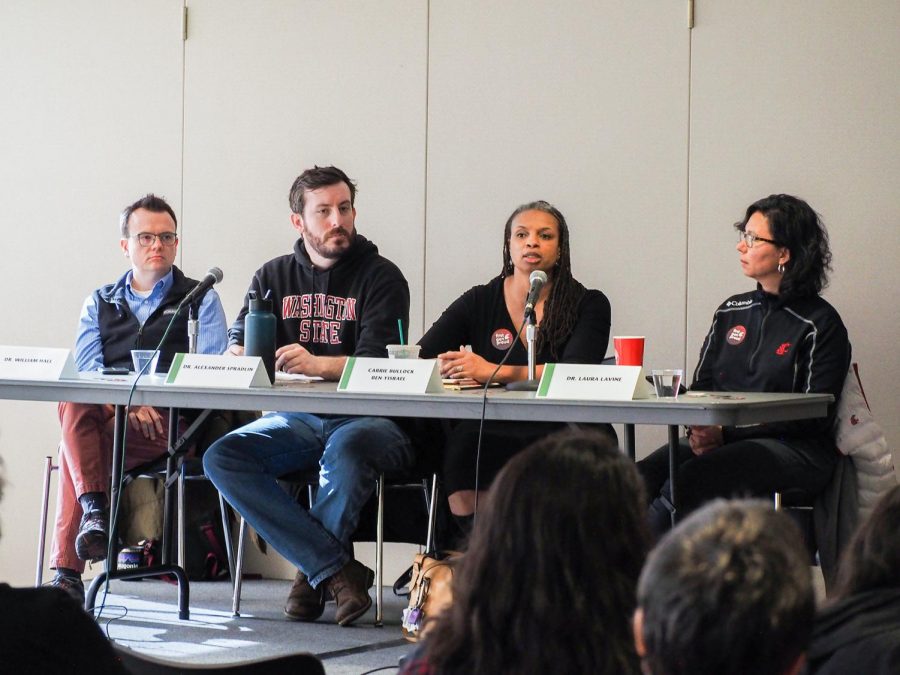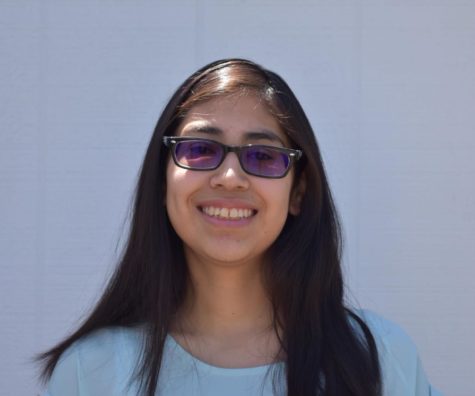Panelists speak about first-gen student support
WSU faculty share advice for underserved students who are first in family to attend
From left to right: William Hall, assistant professor of mathematics education, Alexander Spradlin, clinical assistant professor in the Department of Psychology, Carrie Bullock Ben-Yisrael, academic coordinator and retention specialist for TRIO Student Support Services, and Laura Lavine, professor and chair of the Department of Entomology.
February 24, 2020
Speakers explained how change happens gradually among first-generation, low-income and other underrepresented communities at a panel discussion on Friday.
WSU’s Office of Access and Opportunity in the Division of Student Affairs hosted the discussion panel called Celebrate & Reflect: TRIO in Action at WSU, which is the second in a series.
Raymond Herrera, WSU assistant dean of the graduate school, said TRIO is a federally funded program through the U.S. Department of Education that provides people from underrepresented communities access and opportunities to higher education.
Laura Lavine, WSU professor and chair of the department of entomology, said she was a first-generation college student.
Lavine said her parents wanted her to go to college because they saw education as a way out of working in a textile mill or in the military.
“They really saw it as a way up and out,” she said.
Lavine said her guidance counselor told her to go to Lander University, which was in her town in South Carolina.
She said she graduated from Lander University and a professor of hers suggested she go to graduate school.
Lavine said graduate school was not something she considered but while she was getting her master’s degree at Clemson University her peers encouraged her to keep going.
She said there was a lot of peer mentoring that happened while she was in graduate school which led her to apply for doctorate programs.
Carrie Bullock Ben-Yisrael, WSU academic coordinator/retention specialist for TRIO SSS program, said her parents are educators and she was not a first generation student.
Bullock Ben-Yisrael said in Virginia she had the opportunity to attend a governor’s school for high school students.
She said education was always a part of her life and she knew she was going to college because her father was a band director at Virginia State University.
Bullock Ben-Yisrael said her guidance counselor suggested she go to Mount Holyoke College.
She said going to Mount Holyoke College was the biggest culture shock she had experienced.
There was more money there than she ever saw, Bullock Ben-Yisrael said.
“I realized that the people back home … can absolutely do this, they [just] didn’t have the resource,” she said.
Bullock Ben-Yisrael said she wanted to empower people through their life’s journey.
Alexander Spradlin, WSU clinical assistant professor in the department of psychology, said his parents emphasized the value of education.
Spradlin said he didn’t do well at University of California, Santa Barbara so he moved back home, got a job and went to community college.
He said when he went to UC Santa Barbara he had a friend who was a veteran and had PTSD from serving in Afghanistan which led him to study psychology.
After studying at El Camino Junior College for a year, Spradlin said he transferred to the local Cal State school where he built connections with his professors.
He said seeing how the mentors were helping students get into graduate school gave him a sense of purpose to help affect change.
“I can’t help but see systems around us that are stacked against certain people and stacked for people … like me,” Spradlin said.
He said he wants to help other people the same way other people have helped him in the past.
William Hall, WSU assistant professor of mathematics education, said he is a first-generation student who was helped by TRIO programs in the past.
Hall said he hopes to help students at WSU the same way others have supported him along the way.
He said he did not know what the college experience would be like but that he knew he would go to college.
He was in high school when he was introduced to the Upward Bound program.
It was through the work of other people that got him where he is today, he said.
Bullock Ben-Yisrael said being first-generation tends to overlap with being low income.
“You can’t create academic programs and think they’re just going to pop in and fit in a system that has told them they are not supposed to be there,” she said.
The students want an inclusive experience that is supportive of them, she said.
Spradlin said giving students information on where they can receive help and giving them additional support is important to helping students succeed.
Partnering with Parents and Families of First Gen, which is the third part of the series, happens from noon to 1:30 p.m. on April 23.










